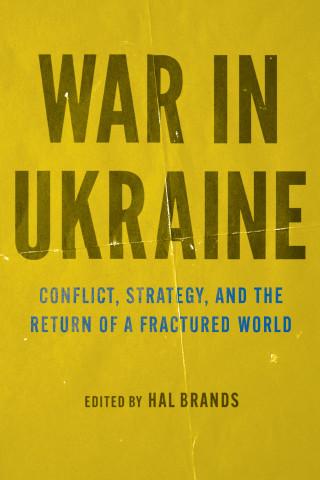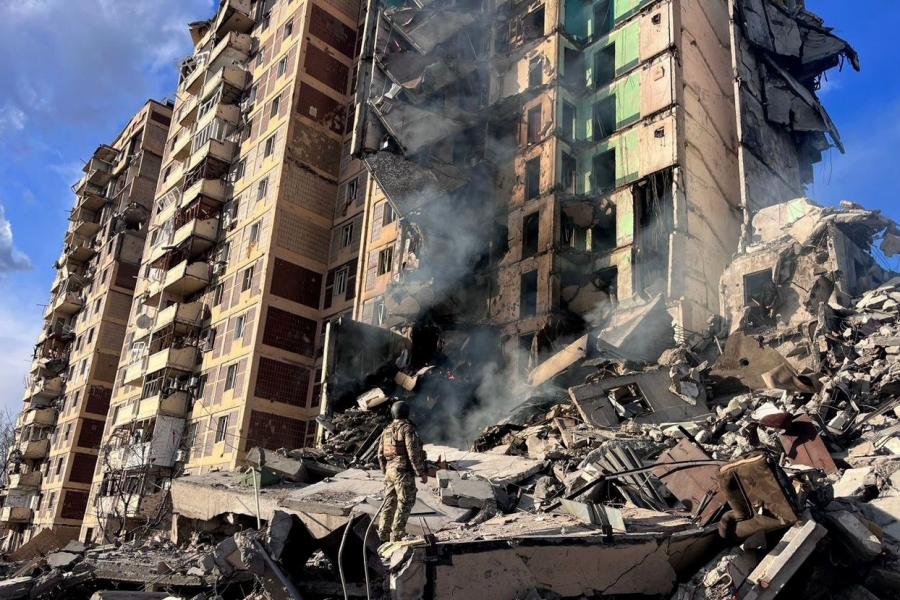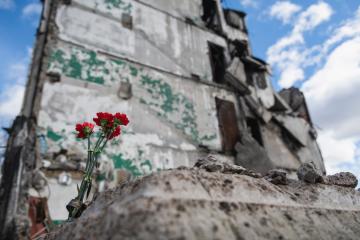After months of debate, the U.S. Senate passed a $95 billion foreign aid package for Ukraine, Israel, and Taiwan on Tuesday. The majority of this money—$61 billion—will go to Ukraine, which has been resisting a Russian invasion since February 2022.
The passage of this much-needed aid package comes following a lengthy and costly delay, says Hal Brands, a U.S. foreign policy expert and a professor of global affairs at JHU's School of Advanced International Studies. Brands is among the SAIS scholars featured in War in Ukraine: Conflict, Strategy, and the Return of a Fractured World, a collection of timely and topical essays published earlier this month by the Johns Hopkins University Press. Brands, who also edited the collection, spoke with the Hub about the book, the recent foreign aid bill, and the state of the conflict in Ukraine.

Image caption: Hal Brands
Image credit: Johns Hopkins University
How has the situation in Ukraine changed since the initial invasion in 2022?
In some ways, the war has gone better than anyone in Ukraine or the West could have imagined. Almost no one thought that Ukraine would still be resisting, that it would still control the vast majority of its territory, when Russia first invaded. The challenge now is that Ukraine has been unable to liberate the territory that Russia still holds—and now Putin is pressing for more.
Congress just passed a foreign aid package for Ukraine after months of debate and delay. What impact has this delay had on the war, and what will change now that more American aid is being sent?
The cost of this delay can be measured in Ukrainian lives and territory lost. Ukrainian units have been badly outgunned on the front lines because they have run out of artillery ammunition. That figured in the loss of Avdiivka, an important fortress city, earlier this year. The new U.S. aid package will help reduce the firepower disadvantage. But Ukraine still needs more manpower, and better fortifications, to defend effectively.
Why was there so much deliberation over the aid package?
The Republican Party has been drifting in the direction of neo-isolationism. In some ways, this part of the party has adopted Donald Trump's view of the world. Even though an overwhelming majority of senators and representatives supported the aid package, opposition from the more outspoken neo-isolationists on the Republican side hijacked the debate for several months.
Looking back at the past two years in Ukraine, what has been the biggest surprise for policy experts in America?
There have been a large number of surprises. Some policy experts were surprised that Russia tried something so audacious as trying to conquer the whole country in the first place. Many analysts were surprised that the initial Russian invasion went so poorly. More recently, many have been surprised by the fact that the Russians have adapted and been fighting more effectively (if brutally and at a very high price). The war reminds us that history is contingent and surprises are commonplace in an activity as complex as armed conflict.

Image credit: Johns Hopkins University Press
War in Ukraine is the combined work of many SAIS experts. Why did you and your colleagues feel that now was the time to write this book?
I decided to do the volume to mark the second anniversary of the full-on Russian invasion in 2022. It was also an opportune, if challenging, moment to bring this group together because there was (and remains) so much uncertainty about how the war will ultimately play out. That said, after two years we have a decent sense of some of the war's global implications—and we are better situated to understand its origins. So the book was an effort to take stock of these issues two years on.
The situation in Ukraine is constantly evolving. Did this make writing and editing a book on the subject more challenging?
Yes, in some ways we were shooting at a moving target. As I wrote in the intro, a history of World War II written in 1942 would have looked very different than one written after the conflict ended. Today, no one knows how this war will end. But we have no good alternative to doing history in real time, because the world can't wait to understand the origins, implications, and trajectory of a conflict as important as this one.
You write in the introduction of War in Ukraine that "We don't yet know how the war in Ukraine will end. We do know, already, that this war has changed the world." How has the world been changed?
The biggest change is that the world has been polarized to a degree we have not seen since the Cold War. You now have a group of advanced democracies, led by the United States, facing off against a group of Eurasian autocracies—Russia, China, Iran, and North Korea. That process was underway in February 2022, but the pressures the war has exerted have dramatically accelerated it. This isn't quite a new Cold War, but it is something that people familiar with the Cold War would surely recognize.
War in Ukraine is currently free to read on Project MUSE.
Posted in Politics+Society
Tagged jhu press, paul h. nitze school of advanced international studies, q+a, ukraine









